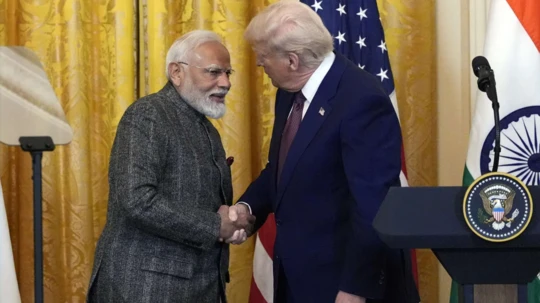The Quadrilateral Security Dialogue, or Quad, has often been hailed as a cornerstone of a free and open Indo-Pacific. Yet, in recent months, rising tensions between the United States and India, over the issue of sweeping tariffs imposed by Washington on Indian goods, raised questions over the future cohesion of this strategic grouping.
However, things are looking slightly better as both India and the US are back at the negotiating table for a trade deal. President Trump had reached out to Prime Minister Narendra Modi, wishing him on his 75th birthday, indicating signs of a reset in bilateral relations, which has offered a renewed hope that the Quad’s vision may regain momentum.
What Is QUAD?
The Quadrilateral Security Dialogue (QUAD), comprising India, Australia, Japan and the United States, is more of an informal alliance between the four countries aimed at promoting ‘open, stable, and prosperous Indo-Pacific.’ Initially proposed by former Japanese Prime Minister Shinzo Abe in 2007, it became a formal grouping in 2017.
The Trump administration hosted the Quad Foreign Ministers’ Meeting in January this year, a day after Trump took the oath of office as President for a second term in the White House and the annual Quad summit is likely to be held later this year.
India-US Tensions And Reports of Trump Skipping QUAD Summit
Tensions escalated between Washington and New Delhi since the Trump administration unilaterally announced sweeping 50 per cent tariffs on Indian goods entering the US, with US officials targeting India for its Russian oil imports. Washington’s unilateral tariff moves against New Delhi have raised questions about whether economic disputes could spill over into the strategic domain.
The question became more imminent after reports emerged suggesting that President Trump may not travel to India to attend the QUAD Summit to be held later this year. A New York Times report, last month, claimed that Trump “no longer plans” to visit India to attend the Quad Summit.
India-US Reset – What We Know So Far
Trump administration’s tariff announcement on Indian goods came at a time when New Delhi and Washington were engaged in negotiations to finalise a bilateral trade deal. New Delhi and Washington have been negotiating a bilateral trade agreement (BTA) since March. The two sides have so far held five rounds of talks, and for the sixth round, a US team was expected to visit India from August 25, which was later cancelled in the wake of tariff tensions.
However, the past few days have rekindled hope with US’ Chief Negotiator Brendan Lynch visiting New Delhi and India’s Commerce Minister Piyush Goyal holding talks in Washington. Lynch and his Indian counterpart Rajesh Agrawal held talks on the proposed bilateral trade agreement earlier this month. Further, at present, Piyush Goyal is in the US with an official delegation for next phase of trade talks.
India and the US were back on the negotiating table soon after Trump’s remarks that efforts are on to address “trade barriers” between the two countries. Teams from both sides are working to conclude negotiations on a bilateral trade deal, PM Modi had said in response to Trump’s message.
Trump had wished PM Modi on his 75th birthday and once again referred to him as a “friend”. Further, the US President had also thanked PM Modi for his support in ending the long-drawn Russia-Ukraine war.
A Signal On Quad’s Future?
The recent tensions in US-India relations could have broader implications for the Quad’s cohesion. However, with recent resumption of high-level engagements signals hope. Following a meeting between US Secretary of State Marco Rubio and India’s External Affairs Minister, the first since tariff move, Washington spoke of the Quad.
“Secretary Rubio and External Affairs Minister Jaishankar agreed that the United States and India will continue working together to promote a free and open Indo-Pacific region, including through the Quad,” the US State Department said in a statement.
Speaking on the future of Quad, political scientist and Eurasia Group President Ian Bremmer said that the US is committed to the grouping and the broader idea is countering China. “The Quad still exists. The Americans are still committed to their troops on the ground in Japan, in South Korea. There is a very significant amount of American military capability with exercises, training, intelligence sharing around the South China Sea. I don’t think that’s going to suddenly go away over the course of the Trump administration,” Bremmer told ANI.
What India Thinks of QUAD
Amid reports of Trump planning to skip the annual summit to be held in India later this year, New Delhi maintained that the QUAD is a “valuable forum.” Ministry of External Affairs spokesperson Randhir Jaiswal, when asked about the grouping at a press briefing earlier this month, said, “The Quad is a valuable forum for discussion on shared interests in a number of areas. The Leaders’ Summit is scheduled through diplomatic consultations among the four partners.”
